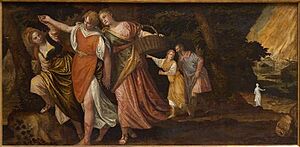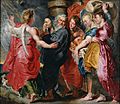Lot (biblical person) facts for kids
Quick facts for kids
Lot
|
|
|---|---|
| לוֹט | |
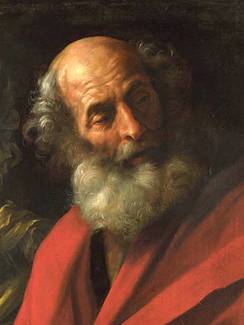
Lot and his Daughters leaving Sodom Guido (1575) by Guido Reni
|
|
| Born | |
| Died | |
| Spouse(s) | Lot's wife |
| Children | Two daughters |
| Parent(s) |
|
| Relatives | |
Lot (Hebrew: לוֹט Lōṭ; Greek: Λώτ Lṓt; Arabic: لُوط Lūṭ) was an important person in the Bible. His story is mainly found in the Book of Genesis, chapters 11-14 and 19. Key events in his life include his travels with his uncle Abraham. He is also known for his escape from the destruction of the cities of Sodom and Gomorrah. During this escape, his wife famously turned into a pillar of salt.
Contents
Lot's Story in the Bible
The Hebrew Bible tells us that Lot was born to a man named Haran. Haran died in a place called Ur of the Chaldees. Lot's grandfather, Terah, decided to move to Canaan. He took Lot, along with his son Abram (who later became Abraham), and Abram's wife Sarai (who later became Sarah). They stopped and lived for a while in a place called Haran, where Terah passed away.
Later, God told Abram to leave his home country. Lot, Abram's nephew, went with him. They traveled to the land of Canaan and settled in the hills near Bethel.
Time in Egypt
Because of a severe lack of food, Abram and Lot traveled to Egypt. While there, Abram pretended that his wife Sarai was his sister. The Pharaoh, the ruler of Egypt, heard about Sarai's beauty. He took Sarai to be his own wife. Because of this, God sent many serious problems upon Pharaoh and his household.
When Pharaoh found out the truth, he confronted Abram. Abram admitted that Sarai had been his wife all along. So, Pharaoh made them leave Egypt.
Abram and Lot Separate
When Abram and Lot returned to the hills of Bethel, they had many animals. Their animal herders started arguing because there wasn't enough land for all their livestock. Abram suggested that they should separate. He let Lot choose where he wanted to settle.
Lot saw that the plains of the Jordan River were very well-watered. They looked like "the gardens of the Lord" or "the land of Egypt." So, Lot chose to live among the cities of the plain, going as far as Sodom. Abram, on the other hand, went to live in Hebron, staying in the land of Canaan.
The Battle of Siddim
The five kingdoms of the plain, including Sodom, had become controlled by an alliance of four eastern kingdoms. This alliance was led by Chedorlaomer, the king of Elam. The plain kingdoms served Chedorlaomer for twelve years. But in the thirteenth year, they decided to rebel.
The next year, Chedorlaomer's four armies returned. At the Battle of Siddim, the kings of Sodom and Gomorrah were defeated. Chedorlaomer took all the valuable things from the cities. He also took captives as he left, including Lot, who was living in Sodom.
When Abram heard what had happened to Lot, he gathered his trained men. He had three hundred and eighteen fighters. Abram chased the four kings' armies all the way to Dan. He divided his forces and pursued them further to Hobah. Abram successfully brought back Lot and all his people and their belongings.
Sodom and Gomorrah
Later, God changed Abram's name to Abraham and Sarai's name to Sarah. God and two angels appeared to Abraham as three men. God promised Abraham that Sarah would have a son. This son would lead to a great and powerful nation. God then told Abraham His plan for Sodom and Gomorrah.
"The cries of Sodom and Gomorrah are very loud, and their sin is extremely serious. I will go down now to see if they have acted exactly as the cries suggest. If not, I will know."
—Genesis 18:20-21
As the angels continued toward Sodom, Abraham pleaded with God for the people of Sodom, where Lot lived. God promised that the city would not be destroyed if fifty good people were found there. Abraham kept asking, lowering the number of good people needed to save the city. He went from fifty to forty-five, then forty, thirty, twenty, and finally, ten.
Lot's Visitors
- Further information: Sodom and Gomorrah
The two angels arrived in Sodom in the evening. Lot was sitting at the city gate. When Lot saw them, he stood up to meet them. He bowed down with his face to the ground. He said, 'Please, my lords, turn aside into your servant's house. Stay there all night and wash your feet. Then you can rise early and go on your way.' They said, 'No, we will stay in the public square all night.' But he urged them strongly, so they turned in to him and entered his house. He prepared a feast for them and baked unleavened bread, and they ate.
—Genesis 19:1-3
After supper, that night before bedtime, the men of the city, both young and old, gathered around Lot's house. They demanded that Lot bring out his two guests. They wanted to harm them. Lot went out, closing the door behind him. He begged them not to do such a terrible thing. He even offered them his daughters instead. The men of Sodom accused Lot of trying to act like a judge. They threatened to do worse to him than they would have done to the visitors.
The angels pulled Lot back into his house. They then struck the angry crowd outside with blindness. The angels told Lot that God had sent them to destroy the place. They told Lot, "Whoever you have in the city, bring them out of this place." Lot went to the houses of his sons-in-law. He warned them to leave the city. But they did not believe him, thinking he was joking.
Lot hesitated in the morning. So the angels had to force him and his family out of the city. They told them to run to the hills and not to look back. Lot was afraid that the hills would not protect them enough from the coming destruction. Instead, he asked the angels if he and his family could hide in a nearby small town. An angel agreed, and that town was later known as Zoar.
When God rained fire and burning sulfur upon Sodom and Gomorrah, Lot's wife looked back at the burning cities. Because she disobeyed, she was turned into a pillar of salt.
The sun had risen on the earth when Lot came to Zoar. Then the LORD caused fire and brimstone to rain upon Sodom and Gomorrah from the LORD out of heaven. He overthrew those cities, and all the Plain, and all the inhabitants of the cities, and everything that grew on the ground. But his wife looked back from behind him, and she became a pillar of salt. And Abraham got up early in the morning to the place where he had stood before the LORD. And he looked out toward Sodom and Gomorrah, and toward all the land of the Plain, and saw, and behold, the smoke of the land went up like the smoke of a furnace.
—Genesis 19:23
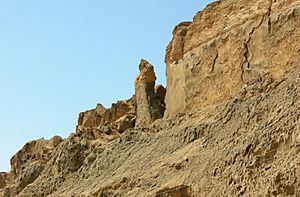
Religious Views of Lot
Jewish View
In the Torah, Lot is first mentioned in the weekly reading portion called Parashat Noach. The rest of Lot's story is read in the portions Parashat Lekh Lekha and Parashat Vayera. In the Midrash, which are Jewish teachings, there are more stories about Lot not found in the Tanakh:
- Abraham took care of Lot after Haran was burned in a huge fire. This fire was started by Nimrod, King of Babylon, who tried to kill Abraham.
- While in Egypt, the Midrash praises Lot. Even though he wanted wealth, he did not tell Pharaoh that Sarah was Abraham's wife.
- According to the Book of Jasher, one of Lot's daughters, Paltith, was burned alive. This happened because she gave bread to a poor man. Her cries were said to reach the heavens.
Christian View
In the Christian New Testament, Lot is seen in a positive way. He is described as a man who felt bad about choosing to live in Sodom. He "vexed his righteous soul from day to day" because of the bad things happening there. Jesus spoke about a future judgment that would come suddenly, just like in Lot's time. He gave a serious warning: "Remember Lot's wife."
Islamic View
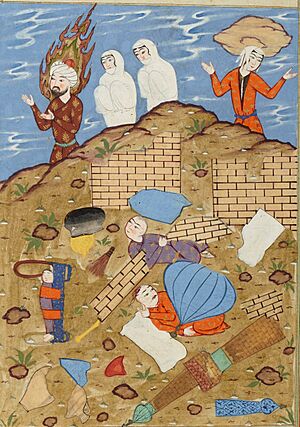
In the Quran, Lut (Arabic: لُوط – Lūṭ) is considered to be the same person as Lot in the Hebrew Bible. He is seen as a messenger of God and a prophet of God.
In Islamic tradition, Lut lived in Ur. He was a nephew of Ibrahim (Abraham). He moved with Ibrahim to Canaan. Lut was sent as a prophet to the cities of Sodom and Gomorrah. His story is used by Muslims to show God's disapproval of certain actions. God commanded him to go to Sodom and Gomorrah. He was to teach them monotheism (belief in one God). He was also to stop them from their violent and harmful acts.
The people of Sodom and Gomorrah ignored Lut's messages. This led to the destruction of the cities. Lut left the city, but his wife was told by angels to stay behind. She died during the destruction. The Quran describes Lut as a prophet. It teaches that all prophets are examples of good morals and spiritual uprightness.
Images for kids
-
Albrecht Dürer, Lot and His Daughters, c. 1499 (National Gallery of Art, Washington D.C.).
-
The Flight of Lot and His Family from Sodom (after Rubens), by Jacob Jordaens, c. 1620 (National Museum of Western Art, Tokyo)
-
The Flight of Lot from Sodom, etching by Gustave Doré, 1866
See also
 In Spanish: Lot (bíblico) para niños
In Spanish: Lot (bíblico) para niños
- Bani Na'im, a Palestinian town with an alleged tomb of Lot
- Baucis and Philemon, figures from Greek mythology with a similar story to Lot's
- Biblical and Quranic narratives
- Biblical narrative: weekly Torah portions
- Lekh-lekha, the 3rd weekly Torah portion with the first part of Abram and Lot's story
- Vayeira, the 4th weekly Torah portion with the last part of Abram/Abraham and Lot's story, including Sodom's destruction
- Monastery of St Lot (5th-7th c.) at the entrance to a cave identified as Lot's shelter
 | Selma Burke |
 | Pauline Powell Burns |
 | Frederick J. Brown |
 | Robert Blackburn |


